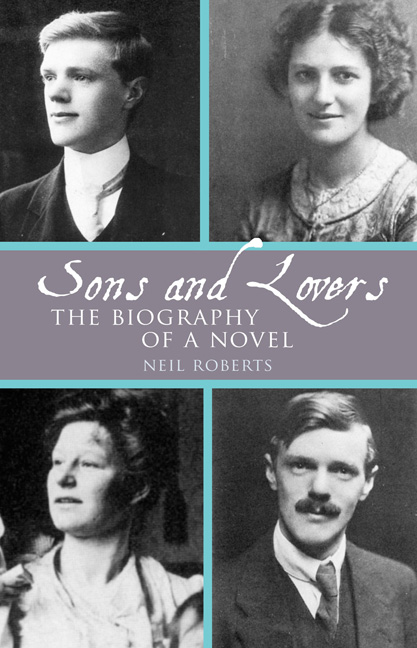Book contents
- Frontmatter
- Dedication
- Contents
- List of Abbreviations
- List of Figures
- Introduction
- 1 Bert and Jessie, 1901–1909
- 2 ‘The Saga of Siegmund’ and the Test on Lawrence, 1909–1910
- 3 ‘Paul Morel I’ and the Death of Lydia Lawrence, August–December 1910
- 4 Betrothal and ‘Paul Morel II’, January–October 1911
- 5 Re-enter Jessie, 1911–1912
- 6 ‘The death-blow to our friendship’, ‘Paul Morel III’, February–June 1912
- 7 From ‘Paul Morel’ to Sons and Lovers, July–November 1912
- 8 Epilogue, 1912–1913
- Bibliography
- Endnotes
- Index
8 - Epilogue, 1912–1913
- Frontmatter
- Dedication
- Contents
- List of Abbreviations
- List of Figures
- Introduction
- 1 Bert and Jessie, 1901–1909
- 2 ‘The Saga of Siegmund’ and the Test on Lawrence, 1909–1910
- 3 ‘Paul Morel I’ and the Death of Lydia Lawrence, August–December 1910
- 4 Betrothal and ‘Paul Morel II’, January–October 1911
- 5 Re-enter Jessie, 1911–1912
- 6 ‘The death-blow to our friendship’, ‘Paul Morel III’, February–June 1912
- 7 From ‘Paul Morel’ to Sons and Lovers, July–November 1912
- 8 Epilogue, 1912–1913
- Bibliography
- Endnotes
- Index
Summary
A fortnight after sending the manuscript Lawrence received a letter from Garnett telling him that it needed to be cut. Lawrence called the letter a ‘wigging’, suggesting that Garnett meant more than that the novel was too long, and said it made him ‘sit in sadness and grief’. Nevertheless, he considered that a postcard was enough for his reply, in which he gave Garnett permission to take out what he thought necessary, and even apologised for the burden of this task (L1 481–82). A day later he wrote to his friend Arthur McLeod saying the novel was ‘quite a great work’ and hoping the nation would not ‘rend’ him for ‘having given them anything so good’ (L1 482).
It is uncharacteristic of Lawrence to be so submissive about the fate of a work he deeply believed in, and the effect on the novel was fairly drastic. Garnett cut it by 10 per cent, and except for the facsimile edited by Mark Schorer in 1977 this was the only version available to the public until 1992. Lawrence's stance is explained by his comment on the postcard that Duckworth's terms were ‘quite gorgeous’. He would earn a royalty of 15 per cent rising to 17.5 per cent after 2,500 copies with, most importantly for a man in immediate need of money, an advance of £100. Even when Garnett had made his cuts and Lawrence had the proofs, he wrote that he didn't mind if ‘Duckworth crosses out a hundred shady pages … It's got to sell, Ie got to live’ (L1 526).
In fact, Garnett's editing was very little a matter of ‘shady pages’. Considering how low the threshold of acceptability was, sexual explicitness caused surprisingly few problems, and these changes scarcely disturb the novel's overall effect. When Paul makes love to Miriam the word ‘thighs’ is replaced by ‘body’, and ‘naked’ is deleted, as is the information that Paul ‘threw off his things’ (MS 408–09, SL333). It is still perfectly obvious what is happening, but Garnett, greatly experienced in dealing with publishers, clearly thought that less visualisation was more acceptable. The censorship of Paul's lovemaking with Clara is a little stronger: Garnett cut Paul's holding and kissing Clara's breasts, and her quivering when he touches her.
- Type
- Chapter
- Information
- Sons and LoversThe Biography of a Novel</I>, pp. 159 - 178Publisher: Liverpool University PressPrint publication year: 2016



